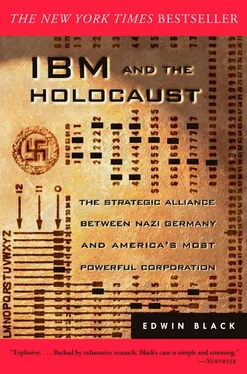After the 1890 census, Hollerith became an overnight tabulating hero. His statistical feat caught the attention of the general scientific world and even the popular newspapers. His systems saved the Census Bureau some $5 million, or about a third of its budget. Computations were completed with unprecedented speed and added a dramatic new dimension to the entire nature of census taking. Now an army of census takers could posit 235 questions, including queries about the languages spoken in the household, the number of children living at home and elsewhere, the level of each family member’s schooling, country of origin, and scores of other traits. Suddenly, the government could profile its own population. 11
Since the Census Bureau only needed most of the tabulators once every decade, and because the defensive inventor always suspected some electrician or mechanic would steal his design, Hollerith decided that the systems would be leased by the government, not purchased. This important decision to lease machines, not sell them, would dominate all major IBM business transactions for the next century. Washington paid Hollerith about $750,000 to rent his machines for the project. Now the inventor’s challenge was to find customers for the machines in between the decennial federal censuses. Quickly, that became no challenge at all. Governments and industry were queuing up for the devices. Census and statistical departments in Russia, Italy, England, France, Austria, and Germany all submitted orders. Hollerith’s new technology was virtually unrivaled. His machines made advanced census taking possible everywhere in the world. He and he alone would control the technology because the punchers, sorters, and tabulators were all de signed to be compatible with each other—and with no other machine that might ever be produced. 12
Moreover, millions of punch cards would be needed to capture the data. Each disposable punch card could essentially be used only one time. Hollerith had the underpinnings of a monopoly and he had not even started the company. Most important, the whole enterprise quickly elevated Hollerith and his system to supranational status. 13Governments were just customers, customers to be kept in check. In many ways, Hollerith felt that he and his technology were indeed bigger than governments. In many ways, he was right.
With the world waiting, it was time for the engineer to launch a corporation. Ironically, Hollerith was too busy garnering new business to create an actual company. Moreover, still in his thirties but already set in his ways, the handlebar mustachioed and often surly Hollerith was not well suited for the task. Hollerith could dress in top hat and elegant walking cane when the occasion required. But he lacked patience and finesse, abhorred the commercialization such a company required, and continually suspected his customers of planning to steal his designs. Maintaining a paternal connection to his invention, Hollerith took everything personally. Hence, no client or contact was too important to antagonize. Grudges were savored long. Feuds relished. Not infrequently, his attitude toward customers was take-it-or-leave-it. Out-spoken and abrasive, he was ready to do combat with government officials whom he suspected of undermining his patent, here or abroad. The little annoyances of life riled him just as much, such as the car that suddenly broke down, prompting an angry letter-writing campaign to the manufacturer. 14
Other than his inventions, Hollerith was said to cherish three things: his German heritage, his privacy, and his cat Bismarck. His link to everything German was obvious to all around him. Hollerith went out of his way to sail to Europe on German vessels. He once justified his friendship with a colleague’s wife, explaining, “[She] is a German so I got along very well with her.” And when colleagues thought he needed a rest, they suggested he take a long vacation in the one place he could relax, his beloved ancestral homeland. 15
For privacy, Hollerith built a tall fence around his home to keep out neighbors and their pets. When too many cats scaled the top to jump into the yard, the ever-inventive Hollerith strung electrical wire along the fence, connected it to a battery, and then perched at his window puffing on a cigar. When a neighbor cat would appear threatening Bismarck’s privacy, Hollerith would depress a switch, sending an electrical jolt into the animal. 16
Hollerith’s first major overseas census was organized for the brutal regime of Czar Nicholas II to launch the first-ever census of an estimated 120 million Russians. Nicholas was anxious to import Hollerith technology. So the inventor traveled to St. Petersburg to seal the enormous contract. 17
Shortly after his return from Russia in late 1896, Hollerith finally incorporated. He located the company office in his austere two-story workshop-warehouse in the Georgetown section of Washington, D.C., just a few minutes drive from both the White House and Census Bureau. He named his new firm with predictable plainness: the Tabulating Machine Company, a name that would be quickly forgotten. 18But that same entity would eventually become IBM, one of the most recognizable commercial names of all time.
* * *
SHORTLY AFTERthe 1900 census, it became apparent to the federal government that it had helped Hollerith’s Tabulating Machine Company achieve a global monopoly, one based on an invention the Census Bureau had—in a way—“commissioned” from an employee on the Bureau’s own payroll, Herman Hollerith. Moreover, the new reform-minded Director of the Census Bureau, Simeon North, uncovered numerous irregularities in the Bureau’s contracts for punch card machines. Hollerith was gouging the federal government. Excessive royalties, phantom machines, inconsistent pricing for machines and punch cards, restrictive use arrangements—the gamut of vendor abuses was discovered. 19
Worse, instead of the Bureau being Hollerith’s best-treated customer, Tabulating Machine Company was charging other governments and commercial clients less. North suspected that even the Russian Czar was paying far less than Uncle Sam. American taxpayers, it seemed, were subsidizing the newly ascended Hollerith empire. 20
When he investigated, North was astonished to learn that his predecessor, William Merriam, had negotiated lucrative and sometimes inexplicable contracts with Hollerith’s firm. Then, little more than a year after Merriam left the Census Bureau, Hollerith hired him as president of Tabulating Machine Company. A rankled North inaugurated a bureaucratic crusade against his own agency’s absolute dependence on Hollerith technology, and the questionable costs. He demanded answers. “All that I de sire to be satisfied of,” North asked of Hollerith, “is that the [U.S.] government is given as fair and as liberal terms as those embodied in the company’s contracts for commercial work and… for other governments.” 21
Hollerith didn’t like being challenged. Rather than assuage his single most important customer, Hollerith launched a tempestuous feud with North, castigating him before Congress, and even to the man who appointed him, President Theodore Roosevelt. Tabulating Machine Company’s technology was indispensable, thought Hollerith. He felt he could pressure and attack the U.S. government without restraint. But then North fought back. Realizing that Hollerith’s patents would expire in 1906, and determined to break the inventor’s chokehold on the Census Bureau, North experimented with another machine, and, finally, in July 1905, he booted the Holleriths out of the Census Bureau altogether. Tabulating Machine Company had lost its best client. 22
A rival tabulator, developed by another Census Bureau technician named James Powers, would be utilized. Powers’ machines were much faster than Hollerith devices. They enjoyed several automated advances over Hollerith, and the units were vastly less expensive. Most of all, Powers’ machines would allow the Census Bureau to break the grip of the Tabulating Machine Company. 23
Читать дальше












